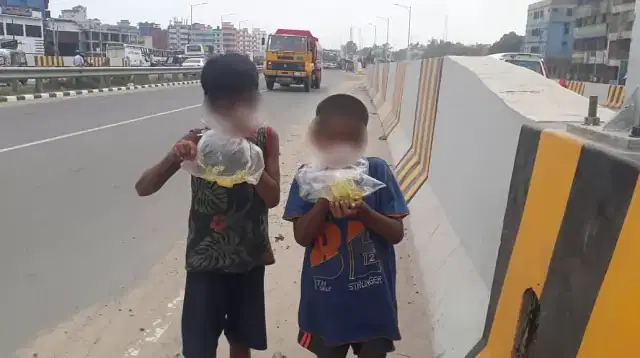
Ibrahim and Hasan (not their real names) are two friends, both seven years old.
They call each other ‘dost’ (buddy). They spend most of the time together, eat together. Hasan has a father, but no mother. Ibrahim has a mother, no father.
Hasan has no idea about is village, while Ibrahim is from Sylhet. Hasan had arrived by train a few years back at the Kamalapur railway station in the capital city. And Ibrahim came to Dhaka with his mother.
The two met a couple of years ago at the Jatrabari intersection and have been friends ever since.
On Sunday afternoon they were at Postagola, along the Dhaka-Mawa highway, inhaling ‘dandi’. ‘Dandi’ is a type of glue.
Drug users put this substance in a polythene packet then place their nose and mouth at the opening and inhale.
This glue called ‘dandi’ has an aromatic compound. Inhaling this substance changes a child’s behavior and emotions. It creates brain disorders in children.
Hasan said, “My mother died long ago. I was with my father. But one day he beat me up and I came to Dhaka. I live on the streets and just beg the entire day.”
Ibrahim says, “I don’t have a father, I have a mother. I live in Dhaka with her. She works the whole day and I beg like Hasan.”
Such substance abuse causes mental disorders in children. Associate professor of the National Mental Health Institute, Helaluddin Ahmed, told Prothom Alo, this glue called ‘dandi’ has an aromatic compound. Inhaling this substance changes a child’s behavior and emotions. It creates brain disorders in children.
Helaluddin Ahmed went on to say many children who take ‘dandi’ are brought to them. Basically these children are separated from their families and are depressed and despondent. They use ‘dandi’ to forget their depression. It is imperative that these children are rehabilitated.
A trip around Old Dhaka’s Raishaheb Bazar, Sadarghat, Babubazar, Sayedabad, Jatrabari, Postagola, Mohakhali and Kamalapur railway station revealed many more children like Ibrahim and Hasan inhaling ‘dandi’.
Some of these children had fathers but no mothers, and some had mothers but no fathers. Most of them were detached from their families. They collected broken bottles and other and other trash from the streets and sold these at the ‘bhangari’ shops which bought such discarded items. Some of them were beggars. They would get the ‘dandi’ from professional drug dealers.
Children are seen inhaling ‘dandi’ near the Syedabad bus terminal, in front of Kamalapur railway station, at the Sadarghat launch terminal, in from of the Dhaka chief metropolitan magistrate (CMM) court and on the Karwan Bazar flyover.
Ever since coronavirus in the country from 8 March, these vagrant children have been more at risk. With the street eating places closed down after the general holiday was declared in 26 March, these children have had a hard time getting food. Many of these street children would eat at these roadside restaurants.
Nothing is done for the rehabilitation and treatment of these child drug users, even though the social welfare directorate is well aware of the matter. Deputy director at the social welfare directorate, Begum Sayeeda Akhter, told Prothom Alo, “We know that many vagrant children in Dhaka city inhale drug called ‘dandi’. They are separated from their families, many without parents. Many of the children are kept in vagrant homes, but there are very few homes for vagrant children in Dhaka and the rest of the country.”
Begum Sayeeda Akhter said that there were only five shelter homes for vagrants in the country, with one in Dhaka which could accommodate only 70 inmates. In all, 1000 persons were kept at these five shelter homes around the country. This was nowhere near the requirement and more shelters were required urgently.
Dhaka North City Corporation mayor Atiqul Islam, speaking to Prothom Alo, said, “We will construct shelter centres for vagrant children if the social welfare directorate asks us in writing. Nothing could be worse than these small children taking drugs. We want to get together and give these children a chance to grow like any other children. As a service giver of the city, I will stand by these children. The city corporation will take all sorts of measures for the welfare of these children.”
This report appeared in the online edition of Prothom Alo and has been rewritten in English by Ayesha Kabir









